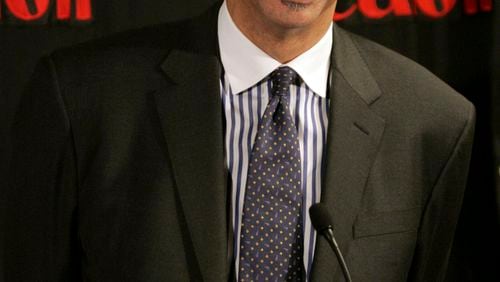There were more than 70,000 fans in the Georgia Dome for Sunday's game between the Falcons and New Orleans Saints. I didn't stop to do an actual breakdown by race but I can verify that there were a high percentage of blacks in attendance, and, shockingly, that didn't seem to stop panicked suburban whites from venturing inside the Perimeter to go to the game.
What a relief. For a moment there, I thought maybe Bruce Levenson was right about why white fans weren't attending Atlanta Hawks games.
If there's one thing I've learned about the Atlanta sports market -- and most sports markets -- it's that fans will attend an event if they believe the product is worth attending. Fans may come up with excuses not to go to a game: cost, traffic, no time or "my friend said that his friend said he had a third cousin who once saw somebody get mugged in the parking lot." But more than anything, it comes down to the product.
I'm bringing this up because Kareem Abdul-Jabbar has written a piece for Time Magazine, headlined, "Bruce Levenson Isn’t a Racist, He’s a Businessman."
I covered the Los Angeles Lakers for part of Abdul-Jabbar's playing days in L.A. I always liked him. He was, without question, one of the most intelligent and thoughtful athletes I've ever covered. That doesn't mean I agree with everything he says (or writes) and this is a perfect example.
Here's a link to the Time story.
Here are some excerpts:
Seems reasonable to ask those questions. If his arena was filled mostly with whites and he wanted to attract blacks, wouldn't he be asking how they could de-emphasize white culture and bias toward white contestants and cheerleaders? Don't you think every corporation in America that is trying to attract a more diverse customer base is discussing how to feature more blacks or Asians or Latinos in their TV ads?
Sure, there are a few assumptions he makes that make me cringe a little: "My theory is that the black crowd scared away the whites and there are simply not enough affluent black fans to build a significant season ticket base." On the other hand, I have no evidence that he's wrong on either count. Even if he is, the question still needed to be raised because racism is a realistic possibility as to why whites in Atlanta, Georgia may not be coming.
Here's the problem. We can find examples for everything.
Are there some whites too scared to drive downtown? Sure.
Are there old folks who would prefer the team play John Denver songs between time-outs instead of Jeezy, Lil Wayne or Kanye? Of course.
But that's not why the Hawks draw crowds of 8,000 (announced as 14,500).
Atlanta is a fickle sports market that will only fully support a product that it loves and is passionate about, and that love and passion can disappear in 12 seconds. It's not a market where fans will pay to show up and boo a team, which they might do in Boston or Chicago. Fans here just won't show up. Fact is, Atlanta is like a lot of markets, Miami and Dallas among them.
San Francisco is a great sports market now, but when I lived there there only the 49ers drew. Nobody went to the Giants' games. Know why? The Giants stunk. As great as AT&T Park is, watch what happens if the Giants have too many lean seasons -- and how quickly fans who don't go will complain about crime in the city.
Levenson has been the face of a dysfunctional ownership group, the Atlanta Spirit. There is baggage that is too great for him and his partners to overcome. There's also the Hawks' history of failed playoff ventures, as well as having polarizing stars like Joe Johnson and Josh Smith.
That's not to take anything away from the job general manager Danny Ferry or coach Mike Budenolzer have done with the on-court product. But they can't just expect people to suddenly show up again.
If Levenson and Ferry and Hawks CEO Steve Koonin want to whine about it and debate how unfair it is that nobody will come watch the team play, that's fine. But please don't come to the table with excuses that it's because whites are scared of blacks or, as Levenson regrettably wrote in his email: "I have told (team executives) I want some white cheerleaders and while I don't care what the color of the artist is, I want the music to be music familiar to a 40 year old white guy if that's our season (tickets) demo. I have also balked when every fan picked out of crowd to shoot shots in some time-out contest is black. I have even bitched that the kiss cam is too black."
By the way, Atlanta is home to as many, if not more, affluent African Americans than any city in the country. Guess what: A lot of them don't go to Hawks games, either.
Abdul-Jabbar is right: Levenson is a businessman. But his stereotypical thinking about races clouds the central marketing problem: Nobody likes him. Nobody likes his team. Nobody likes his franchise.
Funny, but when an Atlanta sports event draws well or sells out, nobody seems to complain about downtown.
COMMENTING IS CLOSED ON THIS BLOG
•






